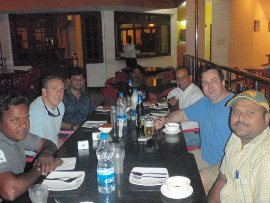p>Doesn’t it seem like some of these people making it big in the business world just have this epiphany one day about a great idea, then they just go and make it happen…ending up with millions and sometimes billions later on?
This was not my experience. What I’ve seen is that, one day you start working on this small idea, then somewhere along the way you stumble upon a bigger idea, which usually isn’t anywhere close to your original idea. If you have gone down the path of an entrepreneur, is this how it happened for you?


 I am writing this from our office in Pondicherry, India, where I’m working with the amazing team of software architects, programmers, quality assurance engineers, test engineers, and designers that we’ve built over the last 7 years. This year our Chief Software Architect, Chris Nolan, joined me so that he could experience some hands on time with the team.
I am writing this from our office in Pondicherry, India, where I’m working with the amazing team of software architects, programmers, quality assurance engineers, test engineers, and designers that we’ve built over the last 7 years. This year our Chief Software Architect, Chris Nolan, joined me so that he could experience some hands on time with the team.